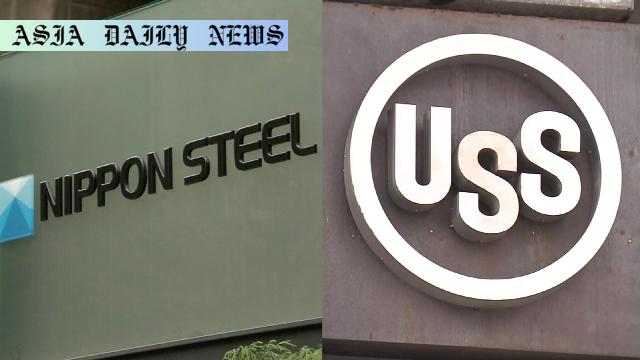US Steel back in the spotlight as Trump backs minority stake, bolstering profitability and heralding a bright future.
Trump supports a minority stake from Nippon Steel in US Steel.
US government opposes complete foreign acquisition of US Steel.
New 25% steel import tariffs aim to protect domestic industry.
Nippon Steel has proposed acquiring all shares of US Steel in 2023.

Introduction to the US Steel and Nippon Steel Situation
In recent developments, US President Donald Trump has expressed a conditional approval for Japan’s Nippon Steel to acquire a minority stake in US Steel. This statement comes amidst controversies surrounding foreign influence over American corporations and the administration’s moves to strengthen domestic industries through tariffs.
Trump’s Remarks and Concerns Over Foreign Control
During a press briefing on Friday, Trump noted that he would not “mind greatly” if Nippon Steel took a minority stake in US Steel, provided that the stake remains below 50%. However, he emphasized that the United States as a nation is psychologically against the possibility of allowing its domestic steel giant to be wholly acquired by a foreign entity.
The president’s comments reflect a protective stance over key industries considered critical to national interests. His remarks demonstrate sensitivity to concerns over national security and economic independence often associated with foreign ownership of major companies.
Tariffs as a Protective Measure
Trump reiterated that his administration’s decision to impose a 25% tariff on steel imports was crucial to safeguarding the domestic steel industry. The tariffs, aimed at curbing excess global production and lowering reliance on imports, are expected to bolster US-based companies, potentially restoring profitability and reinforcing their competitive edge in the market.
“We didn’t want to let US Steel go to a foreign company,” Trump stressed, adding that the company’s outlook is now more promising than it had been in years past. He believes the strengthened trade policies will create better prospects for the steel giant.
Nippon Steel’s Ambitious Plans
Nippon Steel has already announced its proposal to acquire all shares of US Steel as part of a plan to transform the American company into a wholly owned subsidiary. This proposal represents a significant step for Nippon Steel as it seeks to extend its reach into the American market. However, Trump’s latest comments signal that any such proposal would face significant opposition should it seek to gain majority control.
The move would not only mark a milestone in Nippon Steel’s expansion strategy but also reshape the landscape of the global steel industry. However, it stands in stark contrast to the protectionist rhetoric and policies emanating from Washington.
Future Meetings and Expected Negotiations
Following recent summit talks with Japan’s Prime Minister Ishiba Shigeru on February 7, Trump indicated intentions to meet with Nippon Steel executives to discuss the matter further. However, this meeting has yet to occur, leaving industry stakeholders keenly awaiting any concrete developments that could reshape dynamics on both sides.
These potential discussions are critical for negotiating a pathway that balances the interests of both nations — one seeking market opportunities and the other striving to secure its economic sovereignty.
The Broader Implications
This evolving situation poses complex questions about the balance of globalization versus domestic economic policies. On one hand, strategic partnerships with global companies like Nippon Steel could inject efficiency, technology, and capital into US Steel. On the other, ensuring that US Steel remains a predominantly American-controlled entity safeguards national autonomy over critical industries.
Trump’s administration, while forthcoming about inviting foreign investments, maintains a cautious approach to protecting industries deemed crucial for long-term economic security.
Conclusion
The story of US Steel and Nippon Steel is, in many ways, reflective of broader global trends. Protectionism, economic nationalism, and strategic foreign investments are themes defining the modern era. As negotiations unfold, the balance between mutual economic interests and safeguarding national priorities will remain a focal point for experts, politicians, and industry stakeholders alike.
Commentary
Trump’s Bold Stance on US Steel
President Trump’s recent comments on Nippon Steel’s bid to acquire a minority stake in US Steel exemplify his administration’s commitment to American industry. On one hand, his willingness to entertain foreign investment fosters collaboration and innovation. On the other hand, his stringent opposition to a full takeover underscores the value placed on domestic control of critical industries.
Balancing Protectionism and Opportunity
What stands out in this situation is the delicate balancing act between guarding national interests and fostering international partnerships. Trump’s policies, such as the 25% import tariff, send a clear message aimed at revitalizing domestic manufacturing. However, foreign investments can offer much-needed modernization, new technologies, and market growth for legacy companies like US Steel.
Looking Ahead: The Need for Collaboration
Moving forward, what’s crucial is crafting agreements that benefit all parties. Assuming Nippon Steel takes a minority stake, this collaboration could serve as a model—preserving US Steel’s independence while harnessing Nippon Steel’s expertise. For the global steel industry, such partnerships could represent a new era marked by strategic alliances rather than hostile takeovers.
Striking this balance is challenging but necessary. The eventual outcome will have profound implications not only for the companies involved but also for global supply chains and international trade. The world will be watching closely as US Steel and Nippon Steel chart their future course.


